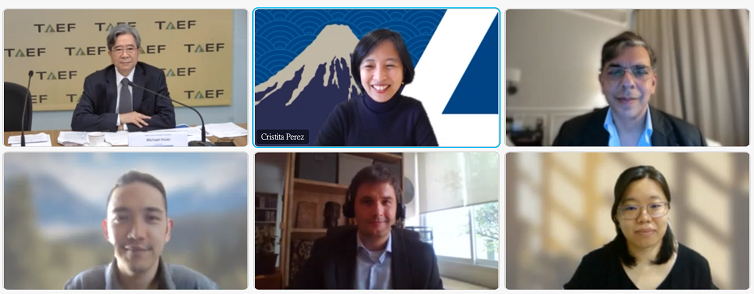
The COVID-19 pandemic has largely complicated our lives. But even before that, megatrends such as automation, digitalization, and globalization are already transforming the way we work and live. In this case, it is noteworthy that the youth are especially and disproportionately affected.
Given these circumstances, the Taiwan-Asia Exchange Foundation (TAEF) and the Konrad Adenauer Stiftung’s (KAS) Regional Economic Programme Asia (SOPAS) jointly organized the conference “A Better (Re)Start: The Future of Work for Young People” today (November 4), exploring in depth the trends, challenges, and opportunities within the youth education and labor environment in Asia.
The session was opened by Ms. Rabea Brauer, KAS Country Representative for Japan and SOPAS Director and Dr. Hsin-Huang Michael Hsiao, Chairman of TAEF.
Ms. Brauer remarked that this online conference strives to provide a platform to provoke new policy ideas on education and career development that are future-proof for our youths. She said that both TAEF and KAS can be very proud of our publications and studies on the future of work facing the youth as it offers valuable insights into navigating this paramount issue.
In his remarks, Dr. Hsiao stressed the importance of the partnership between TAEF and KAS/SOPAS in bringing stakeholders together to realize real changes. He highlighted the need for regional approaches where like-minded nations and Taiwan’s New Southbound Policy countries can work together to tackle the challenges or tap into the opportunities associated with the trends and patterns of the future work landscape.
Chiao Ting Huang, Senior Executive Officer of the Ministry of Labor of Taiwan delivered a keynote to depict the youth employment status and solutions in Taiwan. She highlighted that the government has brought together 8 ministries, investing over NT$ 9 billion in 4 years since 2019 to deliver an array of service measures, including providing subsidies to youths in unemployment, rewards to fresh graduates successfully employed, and subsidies for in-service training.
The conference was followed by Panel 1, where Jayant Menon, Senior Fellow of ISEAS-Yusof Ishak Institute, Upalat Korwatanasakul, Associate Professor of the School of Social Sciences of Waseda University, and Christian Viegelahn, Labour Economist of the Regional Economic and Social Analysis Unit of the International Labour Organization were invited to contribute their insights from diverse perspectives on the topic “What is at Stake? Systemic Changes and Post-Pandemic Labor Market Trends.”
During Panel 2, Professor Chey-Nan Hsieh of the Department of Labor and Human Resources of Chinese Culture University, Gabi Yen, Project Manager of the Talent Circulation Alliance Program, Professor M. Niaz Asadullah of Economics of Monash University Malaysia, who is also the Southeast Asia Lead of the Global Labor Organization, and Chi-Fu, Lin, Chief Executive of Startboard gathered and sparked off a substantial discussion on “Policies that Work: Future-Proofing Education Policies and Career Opportunities.”
Dr. Alan H. Yang, Executive Director of TAEF closed the conference by thanking all the speakers and panelists’ contributions. He mentioned that all of the valuable insights accumulated over the conference will be further published to benefit a wider audience and to continue this important conversation.
The full event report consolidating the conference's outcomes will be released shortly.
About TAEF
Founded in 2018, the Taiwan-Asia Exchange Foundation (TAEF) is the first policy-oriented think tank in Taiwan focusing on Southeast Asian and South Asian affairs. In the spirit of the New Southbound Policy (NSP), the goal of the TAEF is to promote comprehensive ties between Taiwan and the 10 ASEAN countries, 6 South Asian states, as well as Australia and New Zealand through cooperation and exchanges in three major fields – including think tanks, non-governmental organizations (NGOs) and young leaders – to consolidate a sense of regional community in Asia and establish long-term cooperative partnerships.
About KAS
Founded in 1955, the Konrad-Adenauer-Stiftung (KAS) is a political foundation that connects influential leaders in government, business, academia and beyond through over 100 offices across the world. Meanwhile, KAS Regional Economic Programme Asia (SOPAS) is a regional forum that brings together a network of policy makers, economists, political analysts, and thought leaders across Asia to discuss emerging issues, propose policy alternatives, and share best practices. For more details, please visit KAS’s website.